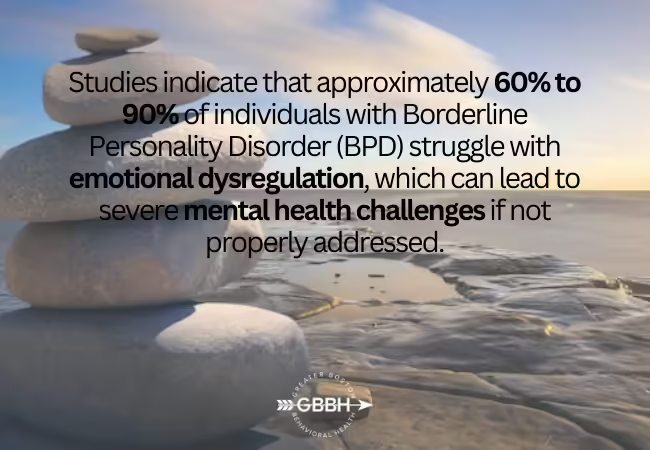Emotional regulation is an essential skill for maintaining mental health and navigating life’s challenges effectively. It is the ability to manage and respond to emotional experiences in a healthy and constructive way. For individuals dealing with depression, anxiety, trauma, or addiction, learning to regulate emotions can be life-changing. At Greater Boston Behavioral Health, we understand that emotional regulation is a crucial component of treatment and recovery. This comprehensive guide will delve into the benefits of regulating your emotions and how specialized therapy and programs can help you achieve this goal.
What Is Emotional Regulation?
Emotional regulation refers to the ability to manage the intensity, duration, and expression of emotions. It involves recognizing your emotional state, understanding what triggers it, and responding in a way that aligns with your values and goals. This skill is essential for managing stress, maintaining healthy relationships, and promoting mental well-being. It’s also a crucial component in therapy programs, including Cognitive-Behavioral Therapy (CBT) and Dialectical Behavior Therapy (DBT), both of which are integral to the comprehensive treatment plans offered at Greater Boston Behavioral Health.
The Benefits of Emotional Regulation
1. Improved Mental Health and Emotional Stability
Emotional regulation helps reduce the risk of developing or exacerbating mental health conditions such as depression, anxiety, and PTSD. People who struggle with unmanaged emotions may experience mood swings, emotional numbness, or impulsive reactions that can negatively impact their mental health. By learning to regulate emotions, individuals can reduce the likelihood of experiencing intense or prolonged episodes of emotional distress. This process is a core component of mental health treatment programs at Greater Boston Behavioral Health, where patients learn tools to manage their emotions more effectively.
2. Enhanced Interpersonal Relationships
Our ability to manage our emotions plays a significant role in our interactions with others. Emotional regulation helps us communicate more effectively, respond to others with empathy, and avoid impulsive reactions that can lead to conflict. People who practice healthy emotional regulation are more likely to build strong, supportive relationships and navigate social challenges with grace and patience. This contributes to a supportive social network, which is vital for mental health and recovery.
3. Reduced Stress and Anxiety
Unregulated emotions can lead to chronic stress, which can increase the risk of developing anxiety disorders and other stress-related health issues. Learning emotional regulation techniques, such as deep breathing, mindfulness, and positive self-talk, can help manage stress levels more effectively. This helps create a sense of calm and well-being. Therapy programs like CBT and DBT incorporate these techniques, enabling individuals to develop long-term strategies for stress management and reducing the likelihood of anxiety.
4. Greater Resilience and Coping Skills
Resilience—the ability to adapt to challenges and recover from setbacks—is an essential part of mental health. Emotional regulation equips individuals with the tools they need to remain calm and composed in difficult situations. This allows them to assess challenges rationally and respond in ways that promote constructive outcomes. Building resilience is especially beneficial for those recovering from trauma or addiction, as it supports the ability to maintain progress and avoid relapse.
5. Better Physical Health
There is a profound connection between emotional health and physical well-being. Chronic emotional stress has been linked to a number of physical health problems, such as heart disease, high blood pressure, and a weakened immune system. Managing emotions effectively reduces the physical toll of stress, promoting better overall health. Regular physical activity, a common practice in many mental health therapy programs, can also help regulate emotions by releasing endorphins and improving mood.
The Role of Emotional Regulation in Mental Health
Emotional regulation is an essential skill that plays a crucial role in maintaining mental health. It involves the ability to manage and respond to emotional experiences in a healthy way. When individuals can effectively regulate their emotions, they are better equipped to cope with stress, navigate challenging situations, and maintain a positive state of well-being.
Poor emotional regulation, on the other hand, can lead to or exacerbate various mental health conditions such as anxiety, depression, PTSD, and addiction. For instance, an inability to manage overwhelming feelings can result in impulsive or harmful behaviors, which may further damage relationships and overall mental health. Conversely, learning to regulate emotions can improve one’s ability to handle stress, make rational decisions, and build stronger interpersonal relationships. This is why emotional regulation is often a key focus in therapy programs, helping individuals develop tools that enable healthier emotional responses and better mental health outcomes.
Common Challenges in Developing Emotional Regulation Skills
While emotional regulation is a vital skill, developing it can be challenging for many people. One common obstacle is past trauma, which can impact how someone experiences and processes emotions. Traumatic experiences can make emotional regulation difficult as the brain may default to a state of heightened alertness, known as hypervigilance, which can lead to emotional reactivity and difficulty calming down.
Chronic stress also plays a significant role in impairing emotional regulation. High levels of stress over long periods can change the brain’s chemistry, making it harder to manage emotions effectively. This can contribute to a cycle where emotions become increasingly difficult to control, leading to negative mental health outcomes.
Additionally, individuals with certain mental health conditions, such as borderline personality disorder (BPD) or generalized anxiety disorder (GAD), often struggle with emotional regulation. These conditions may be associated with impulsive behavior and a persistent sense of emotional instability, which can make it more difficult to develop healthy emotional responses.
To overcome these challenges, targeted strategies and therapeutic interventions are necessary. Techniques such as mindfulness, deep breathing, and cognitive restructuring are often used to help individuals recognize and manage their emotional responses.
The Benefits of Professional Support in Emotional Regulation
While some people may be able to work on emotional regulation independently, professional support can offer significant advantages. Mental health treatment centers, such as Greater Boston Behavioral Health, provide specialized programs designed to help individuals build emotional regulation skills in a structured, supportive environment. Through programs like Intensive Outpatient Programs (IOP) and Partial Hospitalization Programs (PHP), clients can access evidence-based therapies that focus on emotional regulation and overall mental well-being.
Therapies such as Cognitive-Behavioral Therapy (CBT) help individuals identify and reframe negative thought patterns that contribute to emotional instability. Dialectical Behavior Therapy (DBT), specifically, is designed to help individuals develop skills in emotional regulation, mindfulness, distress tolerance, and interpersonal effectiveness. DBT has proven particularly effective for people who struggle with intense emotions and can help them build healthier coping mechanisms.
How Therapy Can Help with Emotional Regulation
Therapy is one of the most effective ways to build and enhance emotional regulation skills. At Greater Boston Behavioral Health, we provide specialized treatment programs that focus on developing these essential skills.
Cognitive-Behavioral Therapy (CBT)
CBT is a popular form of psychotherapy that helps individuals identify and challenge negative thought patterns and beliefs. By addressing the thoughts that contribute to emotional responses, patients learn to replace them with more constructive and balanced thinking. This helps individuals regulate their emotions more effectively and respond to stressors in a healthier way. CBT includes practical techniques that individuals can use to manage their emotions, such as cognitive restructuring, thought-stopping, and positive self-talk.
Dialectical Behavior Therapy (DBT)
DBT is a specialized form of therapy that integrates the principles of CBT with mindfulness practices. It is particularly effective for individuals who struggle with intense emotions, impulsivity, or emotional dysregulation. DBT focuses on accepting emotions as they are while simultaneously working to change harmful patterns. It teaches individuals to balance acceptance with change, leading to healthier emotional responses and improved relationships. Through techniques such as mindfulness, distress tolerance, emotion regulation, and interpersonal effectiveness, patients learn how to manage their emotional states more successfully.
Intensive Outpatient Program (IOP) and Partial Hospitalization Program (PHP)
For those who need more structured support, Intensive Outpatient Programs (IOP) and Partial Hospitalization Programs (PHP) offer comprehensive treatment without requiring a full-time inpatient stay. These programs include therapy sessions focused on emotion regulation strategies, group support, and access to resources that reinforce healthy coping mechanisms. This structure helps individuals apply their emotional regulation skills in a real-world context, promoting long-term mental health and stability.
Practical Tips for Regulating Your Emotions
In addition to professional therapy, there are daily practices you can adopt to improve emotional regulation:
- Practice Mindfulness: Mindfulness techniques, such as deep breathing and meditation, help you stay grounded in the present moment and become more aware of your emotional state.
- Maintain a Routine: A consistent daily routine can provide a sense of structure and stability, which helps regulate emotional responses to stress.
- Stay Active: Exercise is a proven mood booster that helps regulate emotions by releasing feel-good chemicals in the brain.
- Develop Healthy Relationships: Surrounding yourself with supportive and understanding people can help you manage emotions and reduce feelings of isolation.
- Engage in Creative Outlets: Activities like writing, drawing, or music can provide an emotional release and help you process difficult emotions.
Conclusion
Regulating your emotions is key to maintaining mental and physical health and fostering resilience in the face of life’s challenges. By integrating therapeutic techniques like CBT and DBT, along with practical strategies like mindfulness and exercise, you can build stronger emotional regulation skills. At Greater Boston Behavioral Health, we are committed to helping individuals develop these essential skills through tailored treatment plans that support lasting mental well-being. With the right support and tools, you can learn to manage your emotions effectively and lead a more balanced, fulfilling life. Call us at (888)278-0716 today to learn more about our services and how we can help you on your journey to recovery!
FAQs on Importance of Emotional Regulation in Mental Health
Why is emotional regulation important?
Proper emotional regulation supports overall mental health by helping individuals handle stress, reduce impulsivity, maintain relationships, and prevent the development or worsening of mental health conditions like anxiety and depression.
What are common challenges in developing emotional regulation skills?
Common challenges include past trauma, chronic stress, mental health conditions (e.g., BPD or GAD), and negative thought patterns that make emotional responses difficult to control.
How can professional support help with emotional regulation?
Professional support, such as therapy programs at a mental health treatment center, can offer tailored guidance through techniques like Cognitive-Behavioral Therapy (CBT) and Dialectical Behavior Therapy (DBT). These therapies help individuals recognize, manage, and respond to their emotions in healthier ways.
What types of therapy are most effective for improving emotional regulation?
Therapies like CBT help reframe negative thought patterns, while DBT specifically focuses on emotional regulation, mindfulness, distress tolerance, and interpersonal effectiveness. Both are highly effective in promoting better mental health and emotional stability.


